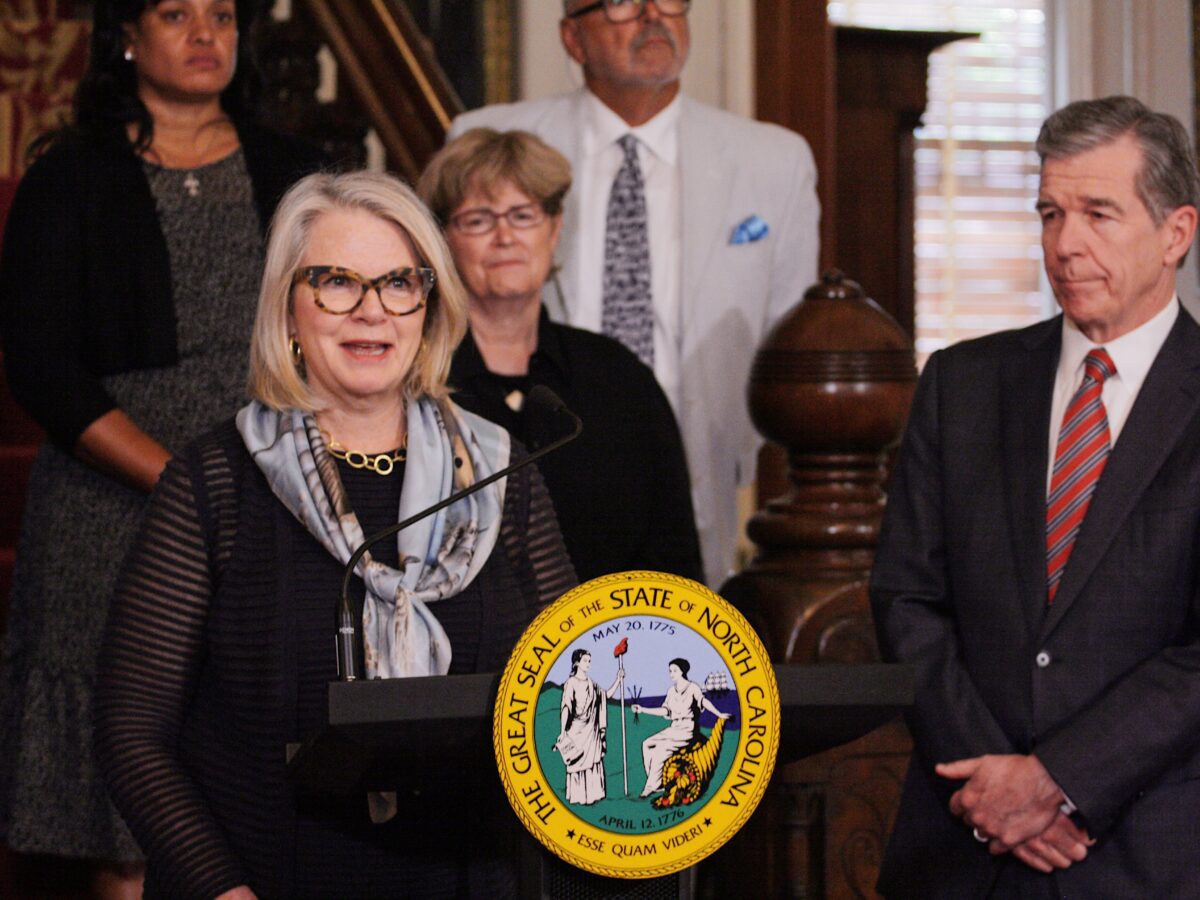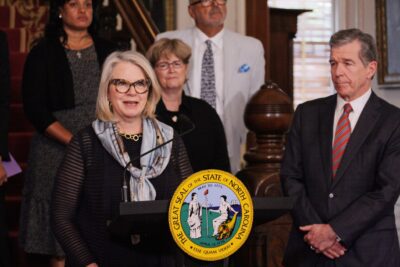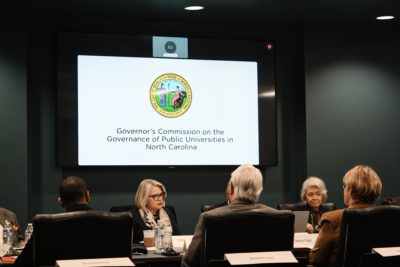
Share this story
- Democratic Gov. Roy Cooper announced the bipartisan commission on Nov. 1, citing signs of undue political influence and bureaucratic meddling among university governance in the state. The commission issued its recommendations on June 12.
- “There’s no expectation that this is going to be embraced and enacted, you know, immediately – this is a report that can be considered over time,” Commission Co-Chair Margaret Spellings said of the report.
|
|
The Governor’s Commission on Public University Governance earlier this month announced its recommendations for strengthening the UNC System, including the creation of a Center of Higher Education Governance, a larger system governance board, and changes to term lengths for board members, among other things.
On Monday, the commission met for the last time to approve a final report of its recommendations.
“The Commission’s recommendations are motivated primarily by the principle that the governing boards of the UNC System and its institutions should reflect, represent and be accountable to the people they serve,” the report says. “While our state is rich in all types of diversity, that diversity and that strength is not reflected in our governance today in the manner contemplated by existing state law.”
Democratic Gov. Roy Cooper announced the commission on Nov. 1, citing signs of undue political influence and bureaucratic meddling among university governance in the state.
The 15-member bipartisan commission, co-chaired by former UNC System leaders Ross and Margaret Spellings, spent the last eight months studying board governance and appointment methods. From February to April, the commission also hosted six public listening sessions across the state to gather stakeholder input on improving public university governance.
The UNC System is made up of 16 public universities that serve nearly 250,000 students each year.
Members of the UNC System Board of Governors, which oversees the entire system, are appointed by the state legislature. Republicans have maintained control of the state legislature for the last decade. The Board of Governors then controls appointments to the individual universities’ boards of trustees as well as chancellors and presidents.
“North Carolina’s visionary leadership in higher education has distinguished our state and made a real difference for our people,” Cooper said in a June 12 release. “These recommendations will help strengthen this system and keep it as the priceless gem and economic recruitment tool it is for our state.”
Approving the report
Of the members present on Monday, only one – John Fraley, a former Republican representative from Mooresville – voted against approving the report.
Though “there are more good ideas that I support in this report than what I’m concerned about,” Fraley voted no due to concerns regarding local boards of trustees. Fraley said he was also concerned about the creation of a Center of Higher Education Governance, which the commission said would assist boards in enhancing existing governance practices and training new board members.
Several members, including Fraley, thanked Spellings and Ross for helping facilitate thoughtful conversations about governance and the system across various lines of difference.
Spellings, who was president of the system from 2016 to 2019, spoke about “expectation management” regarding the commission’s work.
“There’s no expectation that this is going to be embraced and enacted, you know, immediately – this is a report that can be considered over time,” Spellings said. “While we think that these are interlocking and connected, coherent recommendations… there are parts of this that could be considered individually.”
Ross, who was the president of the UNC System from 2011 to 2016, agreed, adding that the commission’s work is meant to lay out long-term plans to enhance the system’s governance structure.
“Hopefully all of (the recommendations) will get some serious consideration,” Ross said. “I hope that it doesn’t just sit on our shelves, but maybe it gets taken off some other shelves and looked at and seriously considered.”
You can view the final report here. Printed copies will be distributed to UNC System President Peter Hans, system board members, and legislative leadership.
The recommendations
The final report includes the commission’s seven recommendations, listed below. The report also includes the history of UNC governance, legislative procedure for board selection, the diversity of the board, along with presentations and agendas from each commission meeting.
- The UNC Board of Governors should create a new Center of Higher Education Governance to optimize the use of good governance principles in higher education throughout America and to assist the Board of Governors and Boards of Trustees (BOTs) in enhancing existing governance practices in North Carolina. Among other things, that center would “provide thought leadership on higher education governance in North Carolina and throughout the United States,” develop and deliver an orientation for all new board members across the state, and maintain a database of trained and interested potential board members.
- The General Assembly should increase the size of the Board of Governors from the current 24 to 32 members. Sixteen of those members should be selected at-large and another 16 selected equally from each of the eight prosperity zones, per the recommendation. The BOG should include five additional non-voting, ex-officio members: the state superintendent, N.C. Community College System president, the current student representative, and the chair of the faculty and staff assemblies. The commission recommends the student representative vote on all matters other than the election of the officers of the BOG.
- The General Assembly should select all members of the Board of Governors who are not ex-officio members in the following manner. The majority party will select 24 members, with half from each chamber. The largest minority party will select eight members, with four from each chamber.
- The General Assembly should increase the size of each of the institutional Boards of Trustees (other than the North Carolina School of Science and Math) to 15 members, not including ex-officio members. The commission recommends seven members of each local board are selected by the BOG, four by the General Assembly, and four by the governor. In addition to the existing student member of each BOT, the commission recommends two non-voting ex-officio members be added – the campus chair of the Faculty Senate and the campus chair of the Staff Assembly. Any appointments allocated to the governor should take place after Jan. 1, 2025, when Cooper’s term expires.
- The General Assembly should increase the length of the terms of members of the Board of Governors and Boards of Trustees from 4 years to 8 years. Members would be limited to one full term on the board to which the individual is appointed. The commission said this recommendations helps build expertise and experience on boards, while also allowing new members to join boards more frequently. Currently, members can serve three terms of four years, or a total of 12 years.
- To enhance transparency and accountability of board members, all general business meetings of the Board of Governors and each Board of Trustees should be livestreamed and recorded. Committee and full board meetings should be publicly notified and held in public locations that can accommodate a reasonable number of members of the public. The commission also recommends all BOG and BOTs members should be required to create and use institutional email accounts for all relevant governance correspondence.
- Any individual who has been serving as a registered lobbyist or as a member of the General Assembly should have a required “cooling-off” period before serving on a governing board. The commission recommends a one-year cooling-off period.
You can read the full recommendations here, on page i-iv.





